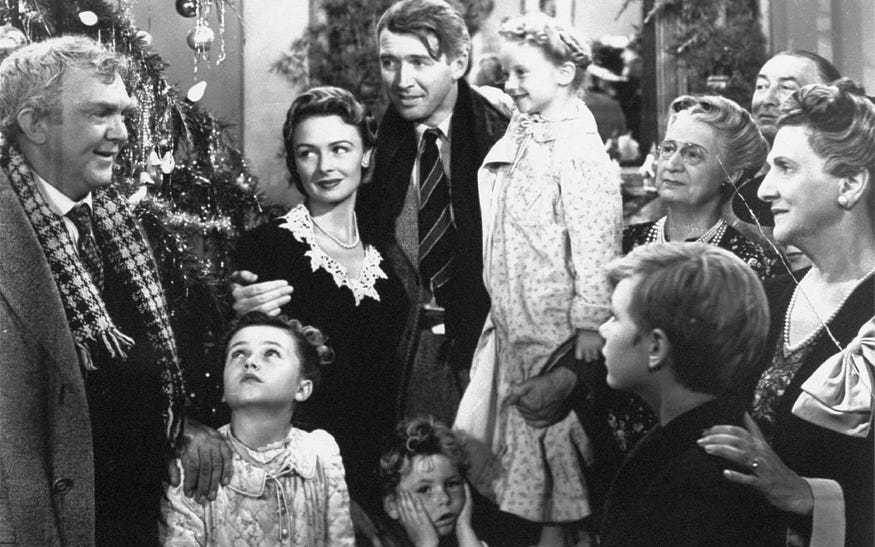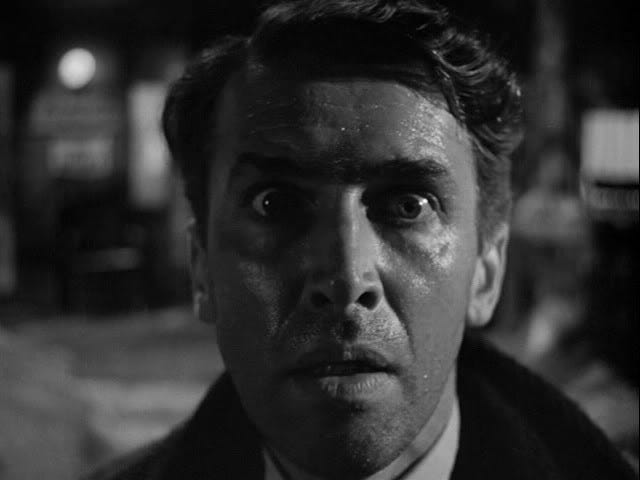It’s not always a Wonderful Life
(But it is)
In a continued time of uncertainty and what could generally be defined as an unsure period in human history, the comfort derived from traditions was even greater than it would have been in normal years. One such tradition in my own life was the annual viewing of Its a Wonderful Life on Christmas Eve. This if anything (particularly in mid-February) has allowed me to reflect more on the lessons one can garner from what was initially a post-war flop and has come to find its way into the modern-day celebration of the festive period.

I would normally give a spoiler warning at this stage of one of my posts when discussing a film, book, or other such form of media. However, in this instance, I will presume I am not spoiling a seventy-eight-year-old film. In the unlikely scenario that you have not watched what has often been hailed as one of the greatest films ever made, I would highly recommend you go watch it and come back to this post.
It’s a Wonderful Life, follows the trials and tribulations of George Bailey. A protagonist who differs from many of the stereotypical heroes who have come to embody the Hero’s Journey, as first detailed by Joseph Campbell in his seminal work, “The Hero with a Thousand Faces”.
George like many others feels the call to adventure and wishes to travel, viewing the world as being filled to the brim with opportunity for a man of his ilk. Yet in what turns out to be the underlying tragedy of this story, doing the right thing holds George back from the glittering promise of such a life. The burdens and weight he carries with him are in and of itself all self-imposed. As his conscience ensures he always knows the right thing to do and he cannot turn away from this as much as it would benefit his dreams.

In the face of everything that comes his way, George stays resilient, constantly putting the needs of his community before his own. Yet as in all things, a price must be paid, and with every action we take consequences emerge. Throughout this story rather than being rewarded for his self-sacrifice and noble decision-making, he is punished at every possible avenue. When he dives into the freezing water to save his drowning younger brother, he loses the hearing in one of his ears, when he warns the local chemist that he has accidentally put poison into the medicine going to a young boy, he is beaten by his employer.
His father who ran the local Building and Loan Association passes away and George delays going to college to run the business to prevent it from failing. Yet he ends up losing out on this opportunity permanently and eventually funds his brother in these endeavors. A run on the bank causes George to lose out on his honeymoon, as he is forced to spend the money he had set aside to keep the Building and Loan liquid.
Despite it all George continues to do what he must, meeting continued failings and disappointments, with persistent strength and putting on a happy face in each instance, as he sought to do what was required of him. He maintains this demeanor right until the very end, when his careless uncle misplaces eight thousand dollars which arrives in the hands of his greatest rival Mr Potter. Faced with an impending arrest and likely jail time for this financial impropriety, the strength and courage he has displayed up until this point flags when he needs it most. Uncertainty and doubt take its stead, as he is informed he is now worth more dead than alive by virtue of his life insurance and decides to take his own life.
In all of our lives, we struggle with the concept of choice, sometimes we are faced with decisions that are far from easy. We may be uncertain as to what is the right course to take and in some instances know exactly what is required of us, but lament how difficult such a course of action would be to take. The consequences of such can eat away at us, as we are forced to live with the outcome of our decisions for the rest of our days.
Yet as Stoics, we know that the true reckoning will be between ourselves and no one else. We may balk at the choice, we may falter and allow fear to hold us back from what is the right course, yet in the end, we must bear with this burden and do the right thing in spite of the personal cost. A sentiment shared by my mentor Marcus Aurelius;
“Just that you do the right thing. The rest doesn’t matter. Cold or warm. Tired or well-rested. Despised or honored.”
The consequences no matter how great, will always be the better choice than to let our fear hold us back from being who we must be and doing the right thing. It is a situation that we will all be faced with at some stage in our lives, virtue is an easy thing to speak of yet to put into practice it is far more difficult. It may take many years for such a situation to arise or it may come regularly to some, each of our circumstances differ, but the important thing is that we stick to our principles. So we can live our lives with the ability to look ourselves in the eyes and not be disappointed in what we see for the rest of our days.
In George Bailey’s instance, the kind acts and sacrifices he made garnered him many friends whose prayers brought the intervention of an angel in the form of Clarence to bring him back from the brink. In order to do so he showed George the way things would have turned out had he never been born and the alternate reality George is forced to endure is truly shocking.

The people he helped and the town he fought for stand unrecognizable. A cruel lesson but a necessary one that drives George to the realization that his life while not the sparkling adventure he had dreamed of, was a life well lived and not a failure in any regard despite the harsh view he had of it. His angel Clarence elaborates;
“Strange isn’t it ? Each man’s life touches so many other lives. When he isn’t around he leaves an awful hole, doesn’t he?”
Before leaving him with a further note that sums up the true message of the film, “Remember no man is a failure who has friends”. In this regard, George is far from the failure he believes himself to be and in an act of astounding kindness, the community he provided for comes to his rescue. Firstly by summoning the angel Clarence and then at the film’s crescendo, all of the people he cared for in the preceding years come to his aid to bail him out and replace the missing money. This finishes with everyone joined in the room singing Auld Lang Syne and his brother Harry giving a toast to his brother, who he deems to be the richest man in town.
It can be very easy to be overwhelmed by what is an admittedly cheesy ending, yet such an outlook would not do justice to what Frank Capra has envisaged here. He does not make light of George’s struggles by creating an ending that ties everything up, perfectly solving the dilemmas facing our protagonist. Rather this is only a minor victory over Mr Potter, who is now eight thousand dollars wealthier and far from defeated. Once the cheer and goodwill of the evening has faded away, George must return to his Building and Loan and contend with the same struggles that I have discussed above without any long-term form of reprieve. Yet despite nothing having changed, in reality, everything has changed.
The shift in perspective was all George needed, with the extreme generosity and kindness of his community, allowing him to shed what had become a cynical outlook on his part. Which Theodore Roosevelt once allowed was the worst way to face the world. Hard times can make us face things with coldness and cynicism, but the world we live in is often times a reflection of what we project upon it. If we see the world as being a dark and cold place, our reality will oftentimes reflect such a view, yet there is always light and warmth should we seek it out. While remaining open to the possibility that not all is cruel and joyless in our lives, during times such as these.
Our perspective is everything and that is a lesson that has become particularly clear to me in recent times. The past year has been a rough one for all of us and many people have struggled, myself included. As a practicing stoic these past few years, I have always tried to meet adversity and tough times, with a simple affirmation that this too shall pass. No matter how grim things have gotten, I have allowed myself to feel the weight of my burdens but maintained that these difficult circumstances will temper my strength. Allowing me to become better for it and more capable of facing what lies ahead.
It has become more and more difficult in recent times however to maintain that optimism and resilience, as stresses continue to mount and the consequences of my choices weigh heavily upon me. It took reaching out to my friends recently to bring my mind back to the lessons of It’s a Wonderful Life, as long as they remain in my life I am far from a failure. As long as I view the world as being capable of such wonderful joy and happiness, the darkness I am forced to face now will always be something I can deal with. The choices I made despite coming at a cost, were the right decisions to make. I would pay them tenfold if I had to in order to protect others in my life and ensure that I can rest easy in the future, knowing I did not bend to fear when the harshness of my circumstances caused me to falter.
Another point that has hit home to me since researching the potential application of stoic principles to this movie, is that we must look out for those of us in our lives who embody the virtue of George Bailey. Those who sacrifice and look out for others, who display such strength in their everyday lives. As none of us can be strong at every opportunity in our lives, weak points emerge and in those instances, we should seek to support our courageous friends who strive to make this world better in their own capacity as members of the human race.
To conclude, not only is It’s a Wonderful Life a timeless classic and a New Year’s Eve tradition I will continue into the foreseeable future, but a piece of art that resonates strongly with my inner Stoic. It speaks to the resilience of the human spirit in the face of difficult times, to the importance of friendship, kindness, and decency above all else, alongside the necessity of doing what you know to be right no matter the cost. In times such as these our perspective like that of George Bailey’s is everything and can help us to weather the storm we are currently enduring and prime us for ones that may be yet to come. So on that note, I would like to thank you all for reading this piece and finish with a quote by the director himself Frank Capra,
“I want to put into your heads that the world is not all evil. Yes, we do have nightmares, but we also have dreams. We do have villainy, but we also have great compassion among ourselves. That’s all I’m here for, really, to try to tell you that there’s good in the world. And that it’s wonderful.”



